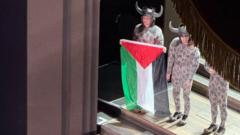Why Did a Performer Unfurl the Palestinian Flag at the Royal Opera House?

Unfolding Events at the Royal Opera House: A Curtain Call of Controversy
The recent incident at the Royal Opera House has sparked significant debate and discussion surrounding the intersection of art, politics, and personal expression. During the final curtain call of Giuseppe Verdi’s opera "Il trovatore," a cast member made headlines by unfurling a Palestinian flag on stage. This spontaneous act of protest has captivated audiences and raised questions about the appropriateness of political statements in artistic venues.
The performance took place on a Saturday night, marking the culmination of an 11-night run of the classic opera. While the audience was immersed in the applause for the cast’s performance, the unfolding drama behind the scenes quickly shifted the focus from the art to a political statement. The Royal Opera House, a prestigious venue located in Covent Garden, responded to the incident by labeling it "completely inappropriate for a curtain call," emphasizing their commitment to political neutrality.
The Incident: What Happened on Stage
The protest began when a cast member, whose identity remains undisclosed, took center stage holding the large flag. Video footage shared on social media captured the essence of the moment: a performer standing in silence, defiantly waving the Palestinian flag while the audience continued to applaud. This act was met with attempts from stage officials to intervene, as one individual was seen trying to wrestle the flag away from the performer, who steadfastly clung to it throughout the curtain call.
Witnesses from the audience described the scene as "extraordinary," noting the unique juxtaposition of a classical opera performance and a politically charged statement. The atmosphere of the Royal Opera House, typically reserved for the appreciation of artistic talent, was abruptly transformed into a stage for political expression. The event has raised eyebrows and sparked discussions around the appropriate boundaries of political expression within cultural institutions.
Royal Opera House's Response
In the aftermath of the incident, the Royal Opera House released a statement addressing the situation. They confirmed that the display of the Palestinian flag was an "unauthorized action" by the artist and reiterated their commitment to political impartiality. This response highlights the delicate balance institutions like the Royal Opera House must maintain between supporting artistic expression and adhering to their foundational principles of neutrality.
The Broader Context: Art and Politics
This incident at the Royal Opera House is not an isolated event but part of a broader trend where artists use their platforms to express political beliefs. The ongoing conflict between Israel and Gaza has prompted various sectors, including the arts, to engage in activism and advocacy. Artists often find themselves in a unique position where their work can influence societal perspectives and provoke discussions about pressing issues.
Political statements can take various forms, from spoken word to visual art, and even performance. The challenge lies in determining the appropriate context for such expressions. While some argue that art should be a space for free expression, others believe that certain venues should remain neutral to allow audiences to engage with the art without political bias. This incident at the Royal Opera House raises critical questions about the role of artists in society and the responsibilities of cultural institutions.
Reactions from the Artistic Community
The artistic community is often divided on issues of political expression. Some artists argue that silence in the face of injustice is complicity, urging fellow creatives to use their platforms for advocacy. Others contend that art should serve as a respite from political turmoil, allowing audiences to escape into a world of beauty and creativity without the weight of current events.
In the case of the Royal Opera House, the incident has provoked a range of responses from artists, critics, and the general public. Some applaud the performer for their bravery in making a statement, while others criticize the act as inappropriate for a space dedicated to the performing arts. This dialogue reflects the ongoing struggle to define the relationship between art and activism in a rapidly changing world.
Implications for Future Performances
The unfolding events at the Royal Opera House may have lasting implications for future performances. Cultural institutions may need to revisit their policies on political expression, fostering an environment where artists can voice their opinions while maintaining the integrity of the institution. This incident could lead to more explicit guidelines regarding political statements during performances, ensuring that the focus remains on the art itself.
Moreover, this situation may encourage other venues to consider how they handle similar protests in the future. The balance between allowing artistic expression and adhering to a commitment to neutrality is a fine line that institutions must navigate carefully. The Royal Opera House's response could set a precedent for how similar situations are addressed in the future, shaping the cultural landscape for years to come.
Conclusion: A Call for Reflection
The incident at the Royal Opera House serves as a powerful reminder of the complex relationship between art, activism, and cultural institutions. As artists and audiences grapple with the implications of political statements in performance venues, it becomes crucial to reflect on the purpose of art in society. Should art serve as a platform for political expression, or should it remain a sanctuary free from the burdens of the outside world? This question invites us to consider our values and the role we want art to play in our lives.
As we continue to navigate a world filled with political turbulence, the lines between art and activism will likely blur. The Royal Opera House incident is just one example of how artists are increasingly willing to leverage their platforms for change. This evolving dynamic challenges us to rethink our perspectives on the role of art in today’s society and what we, as audiences, expect from cultural experiences.
FAQs
What was the incident at the Royal Opera House about?
A cast member unfurled a Palestinian flag during the curtain call of "Il trovatore," which resulted in a brief scuffle with stage officials trying to intervene.
How did the Royal Opera House respond to the protest?
The Royal Opera House stated that the display of the flag was an unauthorized action and emphasized their commitment to political impartiality.
What are the implications of this incident for future performances?
This incident may lead cultural institutions to revisit their policies on political expressions during performances, ensuring a balance between artistic freedom and neutrality.
As we reflect on the intersection of art and politics, how do you believe cultural institutions should navigate these complex issues? #RoyalOperaHouse #ArtAndPolitics #IlTrovatore
Published: 2025-07-20 11:07:04 | Category: technology



